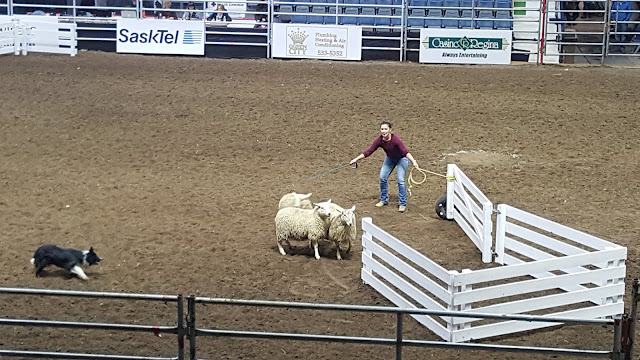Not Our First Rodeo
Decades ago we worked for CBC Radio in Regina and
our favourite time of year was the week we moved out of the studio to broadcast live from Agribition. We’d talk with breeders, farmers, farriers, inventors,
cowboys, farm machinery manufacturers and rodeo clowns. We inhaled the perfume of livestock, leather
and frying onions, and never ran out of stories or people to tell them. So this
week was like coming home.
We built our visit around the International Stock
Dog Championship Trials. The dogs,
almost all of them Border Collies, work with the farmers to manage flocks that
can run to over 1,500 sheep.
The stock dog trials are held in the dirt-covered hockey rink that’s home to the Regina Pats. The sheep are released three at a time so each dog has a fresh trio to herd. The dogs have four minutes to herd the sheep around two barrels, through a chute and into a small pen. The handlers can’t leave their circle at the top of the field, except to open the pen gate at the end of the session. But the handlers do coach the dogs through verbal commands or whistles. The commands include “Come bye”, which means go left or clockwise around the flock. “Away” means go to the right or clockwise. Given the OCD nature of these dogs, the command most in use is “Lie down” (the Border Collie pause button). The whistles are universal – the same in every language.
It is a truth universally acknowledged that
sheep are not the smartest of creatures.
The sheep in this particular flock were relatively tractable during the
morning trials, although every now and then one would go rogue and try to
squeeze through the fence. But they were feistier in the afternoon sessions, as
if over lunch they had hatched a plan to thwart the dogs at every turn.
The dogs performed brilliantly. They stalked, chased, deked, out-manoeuvered
and at times stared down the sheep. But
the ewes scattered in all directions.
They hid behind the chute or stopped stolidly against the boards, daring
the dogs to attack. Sometimes a
pugnacious ewe even challenged the dogs with a head-down butt.
More often than not, the dogs couldn't herd the sheep into the pen, and a few were
disqualified for “gripping” the sheep. They
did the perp walk off the field with telltale strands of wool hanging from
their incisors. More than a few sheep kicked up their heels in triumph as they scampered
to the holding pen.
Agribition is mainly a beef cattle show and the barns
were full of perfectly-groomed Galloways, Charolais, Shorthorns, Longhorns, Limousin,
Gelbvieh, Angus and commercial cattle.
We were particularly taken with the Speckle Park breed – Speckle refers
to the colour, while Park is a pattern of white with coloured points, as these
ladies show.
The breed was developed in Saskatchewan in the
1950s and ‘60s, and is well-suited to the extreme cold and heat on the
prairies. They calve easily, have
gentle dispositions and are generally easy to keep. They also make for pretty good eating. The prize-winning beef is well-marbled and
has a particularly big rib-eye section.
There may not be a better school field trip than
Agribition. The kids we observed ranging around the barns and exhibits seemed
comfortable around the lumbering cows and leggy horses, taking every
opportunity to reach out and pet them. This Highland calf was a particular favourite.
There were also milking, sheep-shearing and
hoof-trimming demonstrations, as well as a rodeo and full-contact jousting competitions. During the day people could go to trade show
sessions ranging from a panel discussion on grain transport to talks about soil
fertility and cannabis opportunities for farmers.
We left, as usual, with brochures, booklets, breed
profiles, postcards, merch and a very rumpled program. We love to see these animals up close, and to
meet some of the people who are producing our food.









I am loving your posts! If there is a fly surviving the cold where you are right now, well, that's me. Loving the sights and sounds and the stories.
ReplyDeleteThis post arrived at the same time as news from my friend in Archer City, Texas. Mary's brother, a real cowboy named Gowdy, had suffered a stroke while out working his ranch more than a year ago now, and life has changed forever. On his birthday, November 20th, five valiant friends and family spent a few hours getting a big cowboy back on a horse. I'm sure his muscles remembered a lifetime of riding.
Thank you for sharing your adventure!
diane
What a wonderful story, Diane! Riding might even help Gowdy recover faster from the stroke. Hoping to get back on a horse myself come spring and summer.
DeleteGlad to hear you're enjoying our "letters home". The leisurely pace of small town life agrees with us. But we're going out more than we did in Vancouver -- a Christmas choir festival at one of the churches tonight, a high school jazz band playing Ellington's Nutcracker on Friday. And the places are packed!
All the best for Christmas and 2019.